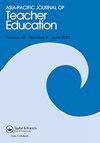Calls to action for teacher education research and practice: voices from the field
IF 1.6
3区 教育学
Q2 EDUCATION & EDUCATIONAL RESEARCH
引用次数: 0
Abstract
This issue marks the second in our special series commemorating the 50th anniversary of the Asia-Pacific Journal of Teacher Education (APJTE). As expressed in our first issue, a number of initiatives are underway to harness the history of the journal – its editors, leading articles that were deemed to make a difference in the field as well as the topics and debates that have headlined different periods in the journal. APJTE is the journal of the Australian Teacher Education Association (ATEA) and as noted in our previous editorial (Takayama, Kettle, Heimans & Biesta, 2022), the association and APJTE have always been internationalist in their orientation; indeed, the association was originally titled the South Pacific Association of Teacher Education before changing to ATEA in 1988. In this issue, our focus turns to calls for action in teacher education research and practice from scholars who represent the diversity of voices characterising the field. The scholars initially presented their ideas at the 2021 ATEA conference and were subsequently invited to expand on them in this celebratory anniversary issue. We have invoked the metaphor of calls and voices to foreground the meaning and urgency of the arguments in the papers. In everyday life, we are familiar with the concept of calls – the call to prayer, bird calls, a clarion call – where the function is to communicate important meaning appropriately and in context. For example, we might understand the respective calls listed above as follows: a gracious invocation to pause and listen, the delineation of territory and the drive for survival and sustainability, and an emphatic request for something to happen. In all three instances, the people and birds issuing the calls are imbued with the authority and capabilities to make their messages meaningful and relevant. In the same way, we argue that the people issuing calls for action in teacher education research and practice in this APJTE publication have the authority and expertise afforded by experience, roles, insights, and longevity of engagement in the field. They offer meaningful and important conceptualisations of teaching, teachers, and teacher education. As such, they delineate the field as it currently stands and foreground the areas that need urgently redressing to ensure our ongoing legitimacy and relevance. In addition, they offer possibilities and strategies for new directions in teacher education, ones that entail change and a level of adaptation to the prevailing conditions, particularly economic and political agendas, and articulate new forms of engagement with communities, students, families, and practitioners. Like all calls to action and the ensuing politics and power relations, our authors remind us that these possibilities open up new conceptual, political, and relational territory but are best ventured into together – as a field, guided by an association such as ATEA. We therefore consider the papers presented in this issue to be compulsory reading for anyone interested in teacher education and invite you to pause and listen to the scholarly voices of the authors. ASIA-PACIFIC JOURNAL OF TEACHER EDUCATION 2022, VOL. 50, NO. 2, 115–117 https://doi.org/10.1080/1359866X.2022.2048464呼吁教师教育研究和实践采取行动:来自实地的声音
本期是我们纪念《亚太师范教育杂志》(APJTE)创刊50周年特别系列的第二期。正如我们在第一期中所表达的那样,许多举措正在进行中,以利用该杂志的历史——其编辑、被认为在该领域产生影响的主要文章,以及该杂志不同时期的主题和辩论。APJTE是澳大利亚教师教育协会(ATEA)的期刊,正如我们之前的社论(Takayama,Kettle,Heimans&Biesta,2022)所指出的,该协会和APJTE在定位上一直是国际主义的;事实上,该协会最初的名称是南太平洋教师教育协会,1988年改为ATEA。在这个问题上,我们的重点转向了代表该领域声音多样性的学者们对教师教育研究和实践的行动呼吁。学者们最初在2021年ATEA会议上提出了他们的想法,随后被邀请在这期庆祝周年的文章中进一步阐述。我们引用了呼叫和声音的隐喻来突出论文中论点的意义和紧迫性。在日常生活中,我们熟悉叫声的概念——祈祷的叫声、鸟叫声、号角声——其功能是在上下文中适当地传达重要意义。例如,我们可能会把上面列出的各个呼吁理解为:亲切地呼吁停下来倾听,划定领土,推动生存和可持续发展,以及强烈要求发生一些事情。在这三种情况下,发出呼吁的人和鸟都被赋予了权威和能力,使他们的信息变得有意义和相关。同样,我们认为,在本APJTE出版物中呼吁在教师教育研究和实践中采取行动的人,拥有该领域的经验、角色、见解和长期参与所提供的权威和专业知识。它们为教学、教师和教师教育提供了有意义和重要的概念。因此,他们描绘了目前的领域,并展望了迫切需要纠正的领域,以确保我们持续的合法性和相关性。此外,它们为教师教育的新方向提供了可能性和战略,这些方向需要变革和一定程度的适应当前条件,特别是经济和政治议程,并阐明了与社区、学生、家庭和从业者接触的新形式。就像所有行动呼吁以及随之而来的政治和权力关系一样,我们的作者提醒我们,这些可能性开辟了新的概念、政治和关系领域,但最好一起冒险——作为一个领域,由ATEA等协会指导。因此,我们认为本期发表的论文是任何对教师教育感兴趣的人的必读之作,并邀请您停下来倾听作者的学术声音。亚太师范教育杂志2022,第50卷,第2期,115-117https://doi.org/10.1080/1359866X.2022.2048464
本文章由计算机程序翻译,如有差异,请以英文原文为准。
求助全文
约1分钟内获得全文
求助全文
来源期刊

Asia-Pacific Journal of Teacher Education
EDUCATION & EDUCATIONAL RESEARCH-
CiteScore
4.40
自引率
7.70%
发文量
29
期刊介绍:
This journal promotes rigorous research that makes a significant contribution to advancing knowledge in teacher education across early childhood, primary, secondary, vocational education and training, and higher education. The journal editors invite for peer review theoretically informed papers - including, but not limited to, empirically grounded research - which focus on significant issues relevant to an international audience in regards to: Teacher education (including initial teacher education and ongoing professional education) of teachers internationally; The cultural, economic, political, social and/or technological dimensions and contexts of teacher education; Change, stability, reform and resistance in (and relating to) teacher education; Improving the quality and impact of research in teacher education.
 求助内容:
求助内容: 应助结果提醒方式:
应助结果提醒方式:


